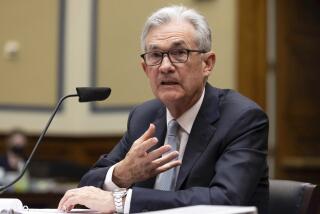Don’t Slash the Budget to the Point of a Slump
- Share via
There is increasing nervousness among private economists and official forecasters about the economic climate for the remainder of this year and into 1987. This is primarily due to a new concern about the contractionary effects that will follow from the tax-reform bill and from the ongoing effort to reduce government outlays.
The lower dollar and declining interest rates should provide a boost to the economy in the months ahead. But so far the trade turnaround from the decline in the dollar has been very slow. Although our net exports will continue to increase, this expansion may not be fast enough to balance the contractionary forces that will be dragging the economy down.
The most serious drag is likely to come from the tax bill, which should soon emerge from the conference committee. Although the tax bill is projected to be revenue neutral for the first five years as a whole, the version produced by the Senate has a $20-billion revenue increase for 1987. That increased tax revenue will have the effect of depressing demand just as the recovery is showing signs of stalling.
Even more significant to the level of demand in the economy will be the changed incentives for private business investment. A substantial disincentive will be the elimination of the investment tax credit and lengthening depreciation allowances for investments in commercial structures. And the overall increase in corporate taxes, which is necessary to finance the increased personal exemption and lower personal tax rates, also reduces funds available for investment. It’s not surprising that business investment has already slipped badly and that the outlook for 1987 is poor.
In the near term the necessary process of deficit reduction is the other important contractionary effect to worry about. Over the past year, the prospect of significant deficit reduction by Congress has helped bring down interest rates and contributed to the dollar’s decline--thus boosting economic activity. But the actual deficit reduction that can be expected between 1986 and 1987 is a two-edged sword.
The resulting confidence in declining deficits will continue to encourage lower interest rates and maintain a competitive dollar. But at the same time the actual deficit reduction means less demand for goods and services--and therefore a temporary decline in economic activity.
Is there any remedy for this expected drag on the economy? We accept as inevitable that there will be a tax bill and that it will have adverse effects on investment demand, which will depress economic activity over the next two years and slow growth in the longer term. Another given, in our view, is that the Federal Reserve can now do little to boost demand through lower interest rates. And jawboning West Germany and Japan to increase their own economic activity has little relevance for the U.S. economic outlook.
But it is important to avoid further dampening of the economy through loss of confidence by the financial markets. These markets will need reassurance that deficit reduction will continue. With last month’s Supreme Court ruling adding uncertainty to the outlook for the Gramm-Rudman process, financial markets would respond badly to any hint that Congress has lost the stomach for spending cuts. Loss of confidence in Congress could result in rising interest rates and a sinking stock market that would further depress business investment.
However, it would be wise to redefine deficit reduction goals if the economy does slow down. Tax revenue automatically falls and the deficit swells. In such a situation, it would be the wrong response for Congress to cut spending even further. The proper goal of deficit reduction over the next few years should be adjusted for the business cycle. If the economy slows and unemployment rises, the target level for the deficit should be raised accordingly.
One rule of thumb would be to raise the target level by $4 billion for each one-tenth of a percent rise in the unemployment rate. If unemployment should rise from the current 7.1% to 7.5%, the target deficit level for 1987 would rise from $144 billion to $160 billion.
These measures will not stop a slowdown in the economy. But, by responding sensibly to changes in the economic climate, Congress can prevent more serious deterioration.
More to Read
Inside the business of entertainment
The Wide Shot brings you news, analysis and insights on everything from streaming wars to production — and what it all means for the future.
You may occasionally receive promotional content from the Los Angeles Times.










